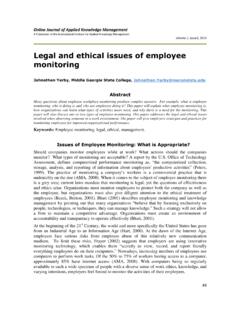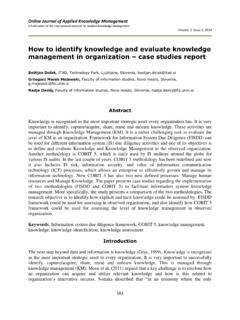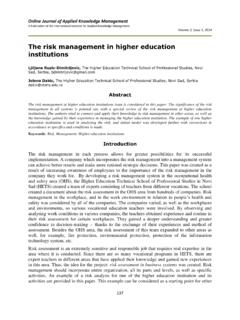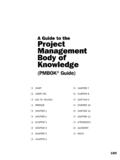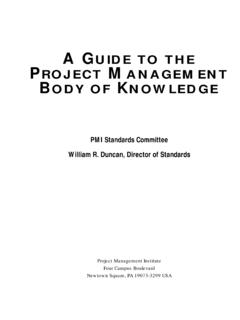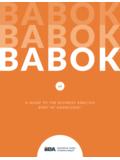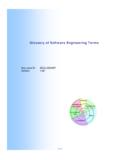Transcription of Defining knowledge management: Toward an …
1 Online Journal of Applied knowledge management A Publication of the International Institute for Applied knowledge management Volume 3, Issue 1, 2015 1 Defining knowledge management : Toward an applied compendium John Girard, Middle Georgia State College, JoAnn Girard, Sagology, Abstract The purpose of the paper is to chronicle the depth and breadth of applied knowledge management definitions penned by researchers and practitioners alike. Once these definitions are part of the body of knowledge they become accessible to academics conducting research, to organizations considering knowledge management , and to other interested parties who wish to learn more about the subject.
2 All of the definitions are freely available from open access sources. Collectively the definitions represent the thoughts of authors in at least 13 countries and from 23 domains. The collection of definitions highlight the truly multidisciplinary nature of knowledge management . The initial analysis revealed the four most common verbs were use, create, share, and manage. The most common nouns were knowledge , process, organization, and information. Keywords: knowledge management , definitions, applied, KM Authors Note: When we wrote our book A Leader s Guide to knowledge management (Girard & Girard, 2009) we deliberately did not include a definition for knowledge management .
3 At the time, we believed the tools, techniques, and tactics for creating and exchanging organizational knowledge were much more important than the labels. Since the book s publication we have had the privilege of sharing our findings with hundreds of managers from dozens of organizations. Over the years we have learned that many managers want or perhaps even need a definition. We decided it is not for us to question their motive, but rather to help these managers in their quest. The genesis of this project was a web-based list of definitions; however, we believe a necessary evolution is the publication of a more formal list in a journal. We hope others will add to the compendium and take on value-added tasks of analyzing the collections.
4 Introduction knowledge management , as a field of study, has now existed for more than 30 years. It has moved beyond an academic theory to an essential component of organizational life. In his seminal essay Where did knowledge management come from? Larry Prusak suggested a good milestone to mark the beginning of the knowledge management timeline is a conference held in Boston in early 1993 ((Prusak, 2001, p. 1003). As Prusak correctly highlighted, nothing comes from nothing, so of course there had been prior interest in the idea; however, the Boston event was likely the first event dedicated to knowledge management . Almost certainly it was at this event that groups of practitioners and academics met to draft a definition for the new domain.)
5 Fast forward three decades when groups of academics and practitioners continue to meet in an attempt to scribe the ever-eluding definition. Online Journal of Applied knowledge management A Publication of the International Institute for Applied knowledge management Volume 3, Issue 1, 2015 2 The primary aim of the project was to demonstrate the depth, breadth, and international nature of knowledge management . This work is the first attempt to catalog, within the academic literature, knowledge management definitions, especially those with an applied orientation. We hope that other researchers will build on this foundation with a view to cataloging the many definitions in use today and in the future.
6 To ensure that all interested parties would have access to the source material, only definitions that are widely available on the Internet were considered. Some might question the exclusion of some oft-cited definitions that are locked in the academic vaults we call journals; however, given the field is about sharing, it seemed rather oxymoronic to discuss definitions that many people cannot access. There is no suggestion that every knowledge management definition penned in the past three decades has been considered. The major goal was to consider a wide variety of definitions in terms of originating discipline and country. We opted to present the definitions by domain, which we acknowledge is very subjective.
7 In addition we have listed the country of origin, which again is rather subjective as it is usually based on the lead author or publisher s country of origin. In both cases the categorization is simply a way to highlight the depth and breadth of the definitions. We encourage other researchers to offer additional ways to organize the collection. That said, the categorization is important as many researchers and practitioners suggest knowledge management is a multidisciplinary field drawing from many subject areas. The Definitions To begin the journey, some of the classic and most cited definitions were considered: knowledge management is therefore a conscious strategy of getting the right knowledge to the right people at the right time and helping people share and put information into action in ways that strive to improve organizational performance (O'Dell & Grayson, 1998).
8 (USA, management ) Davenport and Prusak (1998, p. 163): knowledge management draws from existing resources that your organization may already have in place-good information systems management , organizational change management , and human resources management practices (USA, management ) The new millennium ushered in a wide variety of knowledge management definitions. Below are a selection of definitions, by discipline, that highlight the depth and breadth of thinking in the domain. More than 100 definitions were analyzed and included below. Following each definition is the citation and the country of origin. It is worth noting that many of the definitions are not as precise as some researchers may demand.
9 Arguably, some of the definitions are more descriptive in nature and less precise than ideal. Nevertheless, this is the nature of the real world and we decided to focus on the task of collecting rather than the task of criticizing or reconstructing. Finally, we have included the reference for each of the definitions to facilitate further discovery. Online Journal of Applied knowledge management A Publication of the International Institute for Applied knowledge management Volume 3, Issue 1, 2015 3 Accounting The process of connecting people to people and people to information to create a competitive advantage (Siegel & Shim, 2010). USA Aerospace knowledge management , loosely defined, is a disciplined, holistic approach to using expertise effectively for competitive advantage.
10 At Boeing, knowledge management is made up of a comprehensive system of processes, tools, methods and techniques that enable employees to capture and share information effectively (Arkell, 2007). USA Archivists knowledge management : The administration and oversight of an organization's intellectual capital by managing information and its use in order to maximize its value (Pearce-Moses, 2005, p. 225). USA Artificial Intelligence knowledge management involves the identification and analysis of available and required knowledge assets and knowledge asset related processes, and the subsequent planning and control of actions to develop both the assets and the processes so as to fulfil organizational objectives (Macintosh, 1999).
